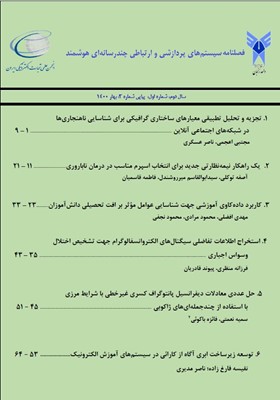توسعه زیرساخت ابری آگاه از کارائی در سیستم های آموزش الکترونیک و مجازی
محورهای موضوعی : پردازش چند رسانه ای، سیستمهای ارتباطی، سیستمهای هوشمند
نفیسه فارغ زاده
1
*
,
ناصر مدیری
2
![]()
1 - گروه آموزشی مهندسی کامپیوتر، دانشگاه آزاد اسلامی واحد خدابنده، قیدار، ایران
2 - گروه ارشد کامپیوتر، دانشکده برق و کامپیوتر، دانشگاه آزاد اسلامی، واحد زنجان، ایران
کلید واژه: سیستم مدیریت یادگیری, آموزش الکترونیک, رایانش ابری, زیرساخت اگاه از کارائی,
چکیده مقاله :
اساسا اشتراک منابع درخواستی و پویائی بارهای کاری در سیستمهای آموزش الکترونیک موجب رقابت بین کاربران و افت کارائی می گردد. وجود نوسانات کارائی و افت کیفیت خدمت در چنین محیط هائی تهدید کننده راندمان کاری و اجرای صحیح خدمات مرتبط و ارائه کارکرد مجتمع می باشد. آگاهی از کارائی به عنوان یک راهکار کلیدی قادر است بارهای کاری را از تاثیرات منفی یکدیگر محافظت نماید. درحال حاضر فقدان چنین زیرساختی موجب نوسانات کارائی و کیفیت خدمات نامطلوب در این سیستمها میگردد. هدف پژوهش حاضر گام برداشتن درجهت جبران نواقص مذکور و از مهمترین دستاوردهای آن توسعه زیرساخت ابری آگاه از کارائی در سیستمهای آموزش الکترونیک می باشد. زیرساخت پیشنهادی برخلاف دیدگاههای موجود، به مکانیزم اجرائی خاصی وابسته نمی باشد و مستقل از سطح خدمت و کنشگرها، کارائی را در کل پشته ابر بصورت یکپارچه و پویا پایش می نماید. نتایج پیاده سازیها و ارزیابی سناریوهای مختلف مبین برتری زیرساخت پیشنهادی و بهبود معیارهای کارائی مرتبط می باشد.
Introduction: The sharing of resources and the dynamics of workloads in e-learning systems cause competition between users and loss of efficiency. Awareness of efficiency as a key solution can protect workloads from each other's negative effects. Currently, the lack of such an infrastructure causes fluctuations in efficiency and unfavorable service quality in these systems. The purpose of the current research is to take steps to compensate for the aforementioned shortcomings and one of the most important achievements is the development of an efficient cloud infrastructure in electronic education systems. Unlike existing approaches, the proposed infrastructure does not depend on a specific execution mechanism and independently of the service level and actors, it monitors the performance of the entire cloud stack in an integrated and dynamic manner. Method: The proposed approach displays e-learning systems based on sets of departments and operational units, components, operational dependencies, and required functional connections. The description of operational units and their duties and functions are as follows: shared knowledge repository, recovery and synchronization unit, audit and monitoring unit, inference and notification unit, control and execution unit. Findings: The results of the implementation and evaluation of different scenarios show the superiority of the proposed infrastructure and the improvement of performance criteria. Discussion: The proposed infrastructure uses performance values and criteria as raw data for dynamic control and performance management. Therefore, this operational framework can be used for different efficiency measures. The proposed approach is able to support performance optimization and management of its requirements for a multi-tenant environment. The approach of the present research, considering the aspects of awareness of efficiency in electronic education systems, can be used as an effort to create a general roadmap and a perspective to achieve awareness of efficiency in basic cloud services
https://doi.org/10.1016/j.ijinfomgt.2015.12.007
https://doi.org/10.1016/j.compedu.2018.05.016.
https://doi.org/10.1080/10494820.2015.1057742
http://dx.doi.org/10.12785/IJCNT/050202
https://doi.org/10.1016/j.jnca.2016.10.024
https://doi.org/10.1016/j.compeleceng.2017.04.018
DOI: 10.1109/IISA.2017.8316369
https://doi.org/10.1016/j.chb.2015.01.001
_||_

